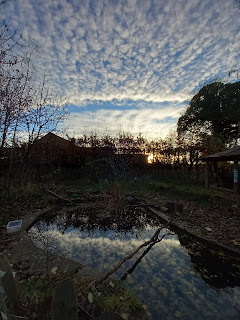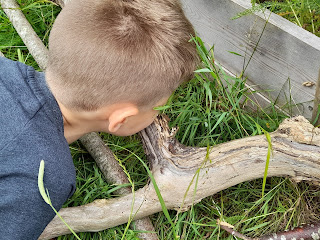Attitude
As leaders, we spend a lot of time anticipating and facilitating the area and the activities. We react to the children's curiosity, investigation, and interests. We encourage them to do a little extra, explore a little further, and discover a little more. We respond to requests and questions, discuss possibilities, introduce ideas and information, and we follow the lead of the children.
On bad days we are patrolling and constantly reminding children to stay safe, or be kind, or to adhere to boundaries. Those days are not frequent, but children will always bring class disagreements and personal feelings to basecamp, and even if it's resolved before they arrive, they cannot always shake off the negative hangover from it. Occasionally a session can struggle to get past playground squabbles no matter what space, communication, or support the adults offer.
On good days we move from group to group, individual to couple, observing what they are doing, ensuring they are safe, and aiming to be a reassuring presence without interfering.
Mostly the children come and find me if they need help, or want to ask if they can do something. Our current Year 6 cohort has been doing Forest School with me since they were in year 3. They don't remember having any other format or Forest School Leader. The expectations I have set are the foundation they take to our other Forest School sites, and I know the other Forest School Leaders they meet have the same expectations as I do. The space may change, the adults may alter, and the activities definitely vary, but the 'rules' are a constant,
We work on a mutual respect basis. I make it clear that we only get to do many of the activities that we have if I am able to trust them. I need to know they understand the rules around a fire, using a knife, climbing a tree, etc. to allow them to do these activities, and I only know that by them demonstrating said knowledge!
Actions speak louder than words!
From EYFS onwards we learn that the very first person to keep us safe is ourselves. We get to choose whether to grab a stinging nettle or sit in the brambles! We choose whether to climb a tree following the safety rules that stop us from getting hurt. In fact, a friend is more likely to be closer to you than an adult, so ask their advice before trying something risky, and in turn, if you see someone making poor choices - call them out! Ask them what they're doing, ask them if they're being safe.
As I walk around I hear children asking others questions if they feel enthusiasm is overtaking safety. I've witnessed children talking nervous friends down from trees. And they can police each other pretty well when they think it is necessary.
We started this term, the first session after Christmas, with a lot of over-excitement and tribalism. The devilment of hindering others seemed to be both infectious and irresistible. The adults outside spent a ridiculous amount of time dealing with small, annoyances, solely designed to get a reaction from another, which led to arguing and stomping and sulking and so much time spent listening to full-scale forensic recitals of how someone walked across a space someone else wanted to run in!
By the end of the session, I didn't want to be there let alone the children!
So we finished a little early, and we had a chat. I asked how much time had they spent moaning versus how much time they had spent having fun? I pointed out that this is their last year of Forest School, they'll be moving on to Secondary School in September, and in just over six months' time, this site will no longer be theirs...
We could continue squabbling over a stick, we could carry on trying to wreck someone's den, we could disrupt each other's games, upset our classmates, spend time sorting it out, and waste our exploring time saying the same things over and over and over...
Or we can build our own dens, find our own sticks, take turns in games, accept it when someone doesn't want to join in, allow those who do want to participate to take part, share, and enjoy the last sessions of their Chartham Primary School Forest School.
What was the point of me trusting them to climb a tree safely if I couldn't trust them to be kind to each other?
They always have, always will, and always should, come to me if there are disagreements. I will happily help them work through upsets large and small. However, the repeated hiding of someone's water bottle, the constant pulling down of a tarpaulin to irritate, and the use of a name they know will make a specific person react is ridiculous behaviour in school and a huge waste of their Forest School time!
They were all asked to think hard about what they wanted to do in Forest School moving forward.
Last week, things were much calmer - well, less fraught! A new game of football/tag rugby/who can get the muddiest was devised and about half the class evolved the game together, with friendly competition and just a few minor 'yellow cards'! A group started a den in a more hidden area of the woodland strip. A few children hung around basecamp and chose to carefully whittle while chatting and concentrating. A few more chose to use peelers and palm drills to make 'weapons'. There was a definite air of camaraderie.
I didn't want to dwell on the negative start of term, but at the end of the session, I did ask how they felt their experience compared to the week before. They were quick to acknowledge that they had had much more fun when they were cooperating and focusing on doing things rather than stopping others from doing things!
I asked them to keep that in mind in everything they do in school, inside and outside and congratulated them on having a great session.
This week I specifically chose to focus on observing.
It didn't take long for the TA outside with me to also notice that the children were organising themselves into groups that don't usually form alliances!
Two different dens, in two different areas, were being constructed, each with builders coming and going.
A chase game had formed and continually altered at children joined in or wandered off.
An expanding group building a tennis-ball-run working together, listening to each other, trying different ideas, adapting the run, constructing, taking it in turns, forming leaders and designers and helpers...
A group set up shop in the mud kitchen.
Another spent ages lifting the icy lid off the giant puddle.
Others hunted for ice in all the corners of Forest School and used it to create pictures.
They all chose an activity, accepted those who wanted to join in as part of their group, and let those whose interests lay elsewhere go and do whatever they wanted to unhindered, and fluidly they moved around all these things with no friction!
They were in essence an entire class team, allowing each other to follow their own interests and supporting them by either helping them with their activity or by not preventing them from their task.
They demonstrated an ability to be kind and compassionate and friendly to each other, no matter what.
It is always tempting to feel the problem is solved! That the solution has been found and there will no longer be any issues...
It is, of course, a tough ask to be constantly harmonious!
I don't expect them to be perfect! They will bring their squabbles back again.
But in the same way they have grown to understand that they can risk assess for themselves and stay safe by following a few rules, I want them to understand that they have 'power' over how much they enjoy themselves through their interactions with each other.
And now they have at least shown they realise they have some influence.
Long may that last.
.jpg)














Comments
Post a Comment